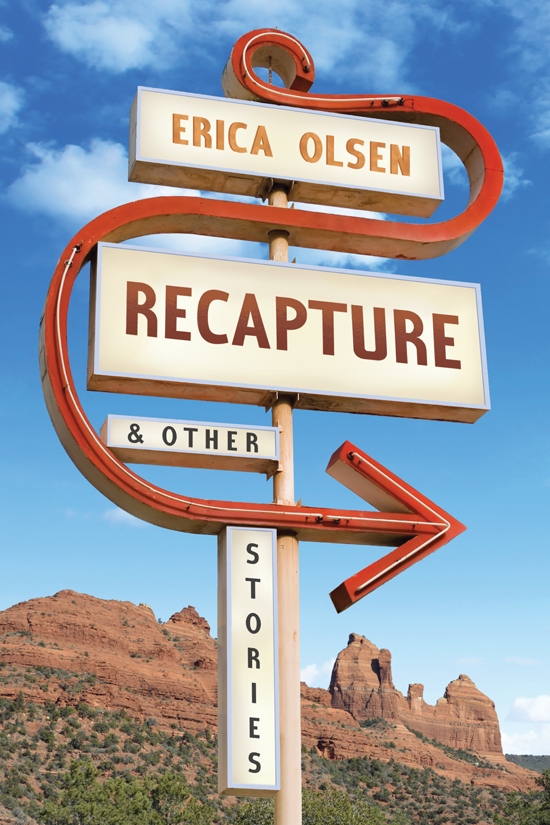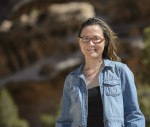
02 Mar BOOK IT! “WOMEN WRITE THE WEST” AT ARROYO MONDAY
Erica Olsen, Barbara Richardson & Jana Richman featured at Arroyo Wine Bar, Monday, March 4, 5 p.m. (In conjunction with Torrey House Press & Great Old Broads for Wilderness)
Telluride is the launch location for a 3-towns-in-3-days book tour by Utah-based Torrey House Press. These three ladies and their current books define the western experience: Past, present, and future. Like desert strata, their stories represent different eras and the inconsistent layers of life. From pipelines and romances that split outpost towns to the historical matriarchy that drives the divine desert feminine to embrace the landscape and all that it attempts to nourish, we have thoroughly enjoyed, and related to, their work. It’s an early start at 5 p.m. so plan on knocking off early from work (or skiing) in order to be in the room with wine glass in hand when we celebrate the phenomenal women that inhabit “the West.”

Erica Olsen, by Michael Troutman
ERICA OLSEN
Hollywood-born and of Korean and Scandinavian heritage, Erica lives in the Four Corners area, where she does archives and curation work for archaeology museums. A graduate of Stanford, Harvard, and the University of Montana MFA program, she has also been a Djerassi Fiction Fellow at the University of Wisconsin. Her short fiction has appeared in ZYZZYVA, High Desert Journal, and other publications, and her nonfiction pieces in magazines including Fine Books & Collections and High Country News. Her work has received awards including the 2011 Barthelme Prize for Short Prose (for “Grand Canyon II,” included in “Recapture”).
“Recapture” explores the canyons, gulches, and vast plains of memory along with the colorful landscapes of the West. By turns lyrical, deadpan, and surreal, Olsen’s calm, clear writing allows the unexpected to manifest itself with understated brilliance. In the stories of “Recapture,” a curator preserves silences in glass jars, a woman works in a larger-than-life-size replica of the Grand Canyon, a hug from a King Kong costume-clad unknown sparks an epiphany on the Empire State Building, and a bookmobile trundles through the deserts of southeastern Utah, its innards full of Jane Austen novels. Archaeology and history, love and loneliness, identity and preservation all wind through the collection, blurring the lines between the natural world and the world we create.

Barbara Richardson
BARBARA RICHARDSON
Barbara’s debut novel “Guest House” launched the first literary Truck Stop Tour in the nation and was a fiction finalist for the Eric Hoffer Award in 2010. Richardson earned an MFA in poetry from Eastern Washington University. Aside from writing, Barbara has renovated four houses, enjoyed Argentine tango, fallen in love with tai chi, helped can the West’s finest plum jam, adored conifers, and planted thousands of trees and shrubs for others. She is also an avid environmentalist and writes and designs landscapes in the foothills of the Colorado Rockies.
In “Tributary,” she claims the land of her Mormon ancestors who settled the northern Salt Lake Valley.
Inspired by her own family history, “Tributary” is the story of Clair Martin and her feisty and occasionally heartrending struggle with her role in the early Mormon Church. For all her devout upbringing, Clair cannot believe herself to be a Mormon Saint. Her stubborn search for identity takes Clair from the confines of the Utah Territory, with its polygamy and rigorous conformity, to the chaos of Reconstruction Dixie and back again. Joined by a ragtag bunch of frontier survivors-an exiled Mormon prophet who lives in a cave, a truth-telling black man, and a renegade Shoshone medicine woman-Clair fights to put down roots in the borderlands of Zion. In the spirit of Willa Cather and Molly Gloss, Richardson’s epic tale of the 1870s explores the backside of history, showing “the far more interesting and unexplored stories of the American West-Mormonism, racism, women who don’t need marriage or men” (Laura Pritchett). This engaging novel goes above and beyond the historical accuracy demanded of its genre by making itself and its characters relevant and relatable to present-day readers.

Jana Richman
JANA RICHMAN
Jana Richman, a sixth-generation Utahn, was born and raised in Utah’s west desert. She writes about issues that threaten to destroy the essence of the west: overpopulation, overdevelopment, rapidly dwindling water aquifers, stupidity, ignorance, arrogance and greed. She also writes about passion, beauty, and love. She is the author of the memoir, “Riding in the Shadows of Saints: A Woman’s Story of Motorcycling the Mormon Trail,” and the novel, “The Last Cowgirl,” winner of the Willa Award for contemporary fiction. She lives in Escalante, Utah, with her husband, writer and transpersonal therapist Steve Defa.
It is not often that a novel of literary fiction incorporates the complexities of a specific, current and controversial issue, but Jana Richman’s “The Ordinary Truth” does just that, with astounding insight and a captivating, heartrending narrative. The recently proposed Nevada pipeline, which would pump water from the desert valleys of Eastern Nevada and Western Utah to Las Vegas, is a component of conflict in the novel.For the Jorgenson family and the close-knit Spring Valley community, the pipeline would mean the end of their cherished ranching lifestyles. When Kate Jorgenson becomes a spokesperson for the Southern Nevada Water Authority and defends the creation of the pipeline, her already-damaged relationship with her mother, Nell, seems beyond repair.
Award-winning author Jana Richman provides readers with numerous lenses through which to view the pipeline proposal, reminding us all of the necessity of multiple ways of seeing. Three generations of strong-willed women show us through their acts of loving rebellion and misguided anger that there are no easy answers when it comes to water in the desert or women in mourning. Their stubborn perspectives on love, loss, and the pumping of precious water stir up conflicts which poignantly highlight the importance of hearing each other out: for the sake of our families, our communities, and wherever it is we call home.
Stop #2: Durango CO: Tuesday, March 5, 6:30pm: Maria’s Bookshop
Stop #3: Crested Butte CO: Wednesday, March 6, 5pm: Townie Books
ABOUT TORREY HOUSE PRESS
Torrey House Press endeavors to increase awareness of and appreciation for the importance of natural landscape through the power of pen and story. They are an independent publisher of environmentally oriented literary fiction and narrative nonfiction books with a tilt toward the West. “With 7 billion souls on the planet we are now living in the ‘Anthropocene’ age of man. We could talk about climate change, about the need to be ecologically aware, about green economics, about water use, about carbon sequestration, and about the importance of bio-diversity until we and everyone else turn blue in the face. Better, we think, to tell stories, and in the fabric of the pages present an understanding and enlightened ethic for living on this planet.” Two percent of their sales are donated to a select group of not-for-profit environmental organizations.
More info: http://torreyhouse.com/
About Great Old Broads of the Wilderness …
Great Old Broads for Wilderness was founded in 1989, on the 25th anniversary of the Wilderness Act, by a feisty group of lady hikers who wanted to refute Utah Sen. Orrin Hatch’s notion that wilderness is inaccessible to elders. Today their wrinkled ranks have grown to include men and younger women (Broads-in-Training), though the majority of the membership continues to be older women committed to protecting wilderness areas. Broads brand of advocacy ranges from education to litigation. They’ve been called the “evidence gathering arm of wilderness advocacy” as well as “the fun bunch.”
For more info on The Broads: http://greatoldbroads.org/


Sorry, the comment form is closed at this time.